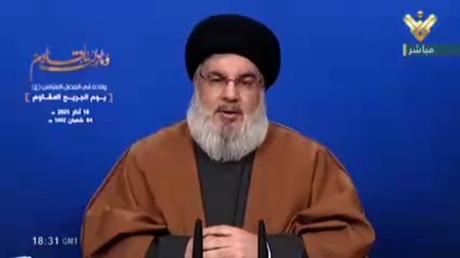Israel asked the U.S. to take steps to deter Iran from attacking Israel in response to the Israeli airstrike in Beirut that killed Hezbollah leader Hassan Nasrallah and a top Iranian general, two Israeli and U.S. officials tell Axios.
Why it matters: The Israel-Hezbollah conflict was already spiraling into an all-out war that could pull in Iran, and that was before Israel killed Iran’s most powerful ally in the region, Nasrallah, and an Islamic Revolutionary Guard Corps general.
- Iran has been careful to avoid any attack on Israel that could pull it into such a war, but officials in Washington and Jerusalem are worried Friday’s strike could push Tehran over the edge.
- President Biden issued a statement on Saturday saying he directed the Secretary of Defense to “further enhance the defense posture of U.S. military forces in the Middle East region to deter aggression and reduce the risk of a broader regional war.”
The latest: Biden had a call on Saturday with Vice President Harris and their national security team to receive an update on the situation in the Middle East, review the status of U.S. military force in the region, and direct ongoing diplomatic efforts to deescalate the conflict, the White House said.
- While leaving church on Saturday, Biden responded to a shouted question about whether an Israeli ground invasion into Lebanon was inevitable, saying: “It’s time for a ceasefire.”
Between the lines: The Israeli request for U.S. support comes after Prime Minister Benjamin Netanyahu flip-flopped on a U.S. push for a ceasefire between Israel and Hezbollah and launched the massive attack without prior consultation even as the U.S. was urging de-escalation.
- President Biden and his administration have stressed that they had no prior knowledge of the attack that killed Nasrallah. But they also haven’t criticized it and have issued statements supporting Israel’s right to self-defense.
- “Nasrallah was a bad guy, but it is frustrating that the Israelis are doing this without consulting us and then ask that we clean up when it comes to deterring Iran,” one U.S. official told Axios.
- Another U.S. official said “Nasrallah has blood on his hands,” but the Biden administration doesn’t see how Israel’s “whack-a-mole” approach will address the larger strategic picture.
What they’re saying: The statement from Biden said Nasrallah’s death is “a measure of justice for his many victims” and the U.S. fully supports Israel’s right to defend itself against Iranian-supported terrorist groups.
- The U.S. goal is to “de-escalate the ongoing conflicts in both Gaza and Lebanon through diplomatic means,” it continued, mentioning negotiations for a deal to release hostages held by Hamas and establish a ceasefire in Gaza, and for a deal to return people to their homes on both sides of the Israel-Lebanon border.
- “It is time for these deals to close, for the threats to Israel to be removed, and for the broader Middle East region to gain greater stability.”
Driving the news: Iranian supreme leader Ali Khamenei issued a statement Saturday that didn’t refer directly to the death of Nasrallah — one of his closest foreign partners — but insisted that Israel’s attacks will not weaken Hezbollah.
- “The terrorist gang ruling Zionist regime has not learned from its one-year criminal war in Gaza… now they are testing the same absurd policy in Lebanon… all the Resistance forces in the region stand with and support Hezbollah. Lebanon will make the transgressing, malicious enemy regret its actions,” he said.
- The Islamic Revolutionary Guards Corps confirmed on Saturday that its commander in Lebanon, Brigadier Gen. Abbas Nilforoushan, was killed in the strike on Hezbollah’s headquarters.
Behind the scenes: In a conversation with his U.S. counterpart Secretary of Defense Lloyd Austin after the attack on Friday, Israeli Defense Minister Yoav Gallant asked that the U.S. take operational steps and issue public statements to deter Iran from launching an attack against Israel, U.S. and Israeli officials say.
- “Secretary Austin stressed that the U.S. is determined to prevent Iran and Iranian-backed partners and proxies from exploiting the situation or expanding the conflict,” the Pentagon said.
- Pentagon Press Secretary Maj. Gen. Pat Ryder said Austin made clear that the U.S. “remains postured to protect U.S. forces and facilities in the region and committed to the defense of Israel.”
The big picture: Iran has strengthened Hezbollah’s military capabilities over many years to serve as a deterrent against Israel, especially from possible attacks on Iran’s nuclear program.
- Last April, Iran attacked Israel directly for the first time in history in retaliation for an Israeli airstrike that killed Iran’s top general in Syria. The attack was mostly thwarted by an international and regional coalition led by the U.S. and Israel.
- Iran has vowed to respond to the assassination by Israel of Hamas leader Ismail Haniyeh in Tehran two months ago, but hasn’t yet done so.
- In recent weeks, Hezbollah urged Iran to launch an attack against Israel, but Iran didn’t agree to do so, Axios reported.
Friction point: Three U.S. officials tell Axios the Biden administration supports the killing of Nasrallah, but is frustrated about the lack of consultation and transparency from the Israeli side.
- Austin, CIA Director Bill Burns and CENTCOM commander Gen. Michael Kurilla were all briefed by their Israeli counterparts as the operation was already underway and without real possibility to weigh in or express their opinions, the U.S. officials said.
What’s next: One U.S. officials said the Biden administration’s top priority now is to avoid an Israeli ground invasion in Lebanon, as well as prevent direct Iranian involvement in the fighting and reach a diplomatic solution that allows civilians on both sides of the Israel-Lebanon border to return home.
AXIOS


Leave a Reply
You must be logged in to post a comment.